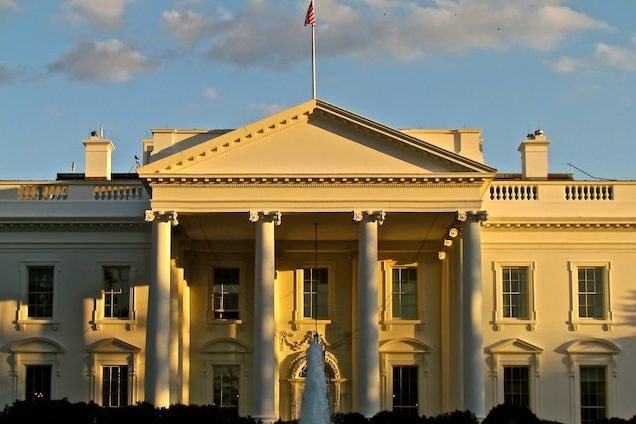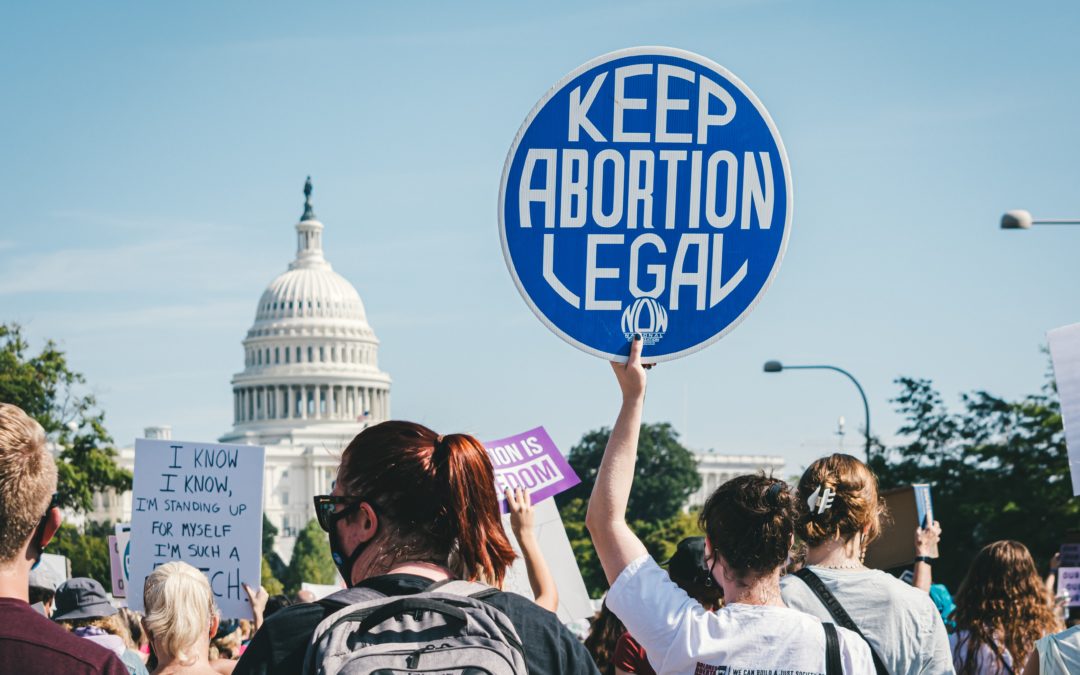
by Jonathan P-Wright | Jun 20, 2023 | Latest, POLITICS |
Photo by Suzy Brooks on Unsplash
Imagine a world where the fundamental right to make decisions about one’s own body is stripped away. A world where women are left vulnerable and at the mercy of the political whims of their state’s legislators. The historic ruling of the United States Supreme Court to reverse Roe v. Wade has created a new reality for millions of American women. They now face unprecedented challenges and uncertainties regarding their reproductive rights and health. Gone are the federal protections that once safeguarded a
woman’s right to choose, and in their place, a patchwork of state laws that either uphold or dismantle the right to abortion.
In the aftermath of this monumental shift, the debate around women’s reproductive rights has reached a fever pitch. Proponents argue that the decision empowers states to make decisions that reflect the values of their constituents, while opponents decry the ruling as a devastating blow to women’s rights. Amidst this highly charged political landscape, First Lady Jill Biden is stepping up to give voice to those most affected by the decision. She is scheduled to moderate a roundtable discussion at the White House for women who were negatively impacted by Roe v. Wade and had their options for medical assistance denied.
As we delve deeper into the implications of this historic ruling, we will examine the legal and political ramifications, the impact on women’s healthcare, and the role that individual states play in shaping the future of reproductive rights in America.
The Legal and Political Ramifications
The Supreme Court has reversed Roe v. Wade, the landmark case that made abortion legal in the U.S. in 1973 . This means that states can now ban or restrict abortion as they see fit. Many people are angry and worried about this change, because it takes away a woman’s right to choose what to do with her body and her pregnancy . It also opens the door for more attacks on other individual rights.
Supporters of the ruling argue that it returns power to the states, allowing them to implement laws that reflect the values and beliefs of their constituents. Critics, however, contend that this decision is a thinly veiled attempt to control women’s bodies and limit their autonomy. The fact remains that without federal protections, women’s reproductive rights are now subject to the whims of state lawmakers, creating an uncertain future for millions across the country.
The political implications of this decision reach beyond the realm of women’s rights. The overturning of Roe v. Wade has ignited a firestorm of debate on the role of the federal government and the judiciary, further deepening the divide in an already polarized nation. As politicians on both sides of the aisle grapple with the fallout, the question becomes, what does this mean for the future of American democracy?
Impact on Women’s Healthcare
The ramifications of the Supreme Court’s decision extend beyond the legal and political spheres, directly impacting the healthcare options available to women. Without federal protections, states are now free to restrict or ban abortion outright, leaving countless women without access to safe and affordable medical care.
In states where abortion restrictions are tightened or eliminated, women may be forced to seek out unsafe or illegal methods to terminate their pregnancies. This not only puts their lives at risk but also overburdens an already strained healthcare system. Moreover, the lack of access to comprehensive reproductive healthcare can exacerbate existing health disparities, particularly among low-income and minority communities.
For women who live in states that uphold their right to choose, the situation may not be much better. The influx of women seeking care across state lines will place significant strain on the healthcare providers in these states, leading to longer wait times and reduced access to care for all women, regardless of their circumstances.
The Role of Individual States
At the heart of this historic decision lies the question of states’ rights and individual autonomy. With the federal protections of Roe v. Wade dismantled, the responsibility to uphold or restrict women’s reproductive rights falls squarely on the shoulders of state legislatures.
In some states, lawmakers have already begun enacting restrictive abortion laws, emboldened by the Supreme Court’s ruling. Other states, however, have taken steps to protect and expand women’s access to reproductive healthcare. The result is a patchwork of state laws that either uphold or dismantle the right to abortion, creating an uneven landscape for women’s rights across the country.
As the battle over women’s reproductive rights rages on, it is crucial for citizens to remain informed and engaged in the political process. By voting for representatives who support their values, engaging in advocacy, and staying informed about the issues, individuals can play a critical role in shaping the future of women’s rights in their states and across the nation.

by Samantha J Rice | Mar 22, 2023 | Latest, Social Justice |
Abortion is a topic that has always been controversial, and now it’s sparked a heated debate in South Carolina. In a new bill proposed by lawmakers, abortions could carry the punishment of death. Yes, you read that right – the death penalty for terminating a pregnancy. This proposal has many people stunned and outraged as they question the legality and morality behind such extreme measures.
“Imagine the unimaginable- a state where women could face the death penalty for making choices about their own bodies. That’s exactly what South Carolina lawmakers are proposing with a new bill that aims to criminalize abortions in all cases, even rape and incest. As the nation watches this controversial legislation unfold, it raises questions about reproductive rights, government control over personal decisions, and the value of human life. In this blog post, we’ll explore the latest developments on this heated topic and discuss why such extreme measures warrant attention from every American.
The bill is similar to one that was proposed in Texas last year, but did not make it through the legislature. If passed, South Carolina would become the first state in the nation to enact such a law.
Abortion rights advocates have already denounced the bill, calling it unconstitutional and dangerous. They argue that it would criminalize women and doctors, and put women’s lives at risk. They also point out that there are already laws on the books that make it a crime to harm or kill a pregnant woman.
Critics of the bill say that it is nothing more than a political stunt designed to score points with conservative voters. They argue that it is highly unlikely to pass constitutional muster, and even if it did, would almost certainly be overturned by the courts.
“This bill is about protecting the lives of the innocent, and we believe that every life is valuable,” said Rep. Steven Long, one of the bill’s sponsors. “We think it’s important that we stand up for those who can’t speak for themselves.”
Currently, under South Carolina law, abortion is only legal in cases of rape, incest, or when the life of the mother is at risk. This bill would criminalize all abortions, regardless of the circumstances. Women who undergo abortions would be subject to felony charges and up to 10 years in prison. Doctors who perform abortions would be charged with murder and could face the death penalty.
This bill is clearly an attack on women’s rights and access to safe and legal abortion. If it becomes law, it will force women to seek out illegal and dangerous abortions, or forego the procedure altogether. This will put women’s health and lives at risk. It is imperative that this bill does not become law.
This proposed bill is a stark reminder that abortion access in the United States is under constant threat. South Carolina lawmakers are using their power to try to restrict abortion access for those who need it, and this new bill would be an extreme violation of reproductive rights if passed. We must remain vigilant and fight to protect our reproductive freedom, no matter what restrictions are proposed in state legislatures across the country.

by Tanyette McCoy Davis | Mar 21, 2023 | Latest, Social Justice |
In response to the recent police brutality cases that have garnered national attention, California is proposing a new law that would allow victims of police brutality to receive compensation from the state. This proposition would create a fund to pay for damages suffered by victims of police misconduct, and would be funded by a surcharge on fines and bail schedules for criminal offenses.
This proposition is an important step in addressing the problem of police brutality, as it would provide some measure of justice for victims who have often been ignored or mistreated by the system. It is also a reminder that police officers are sworn to protect and serve the public, and when they violate that trust, they should be held accountable
One high-profile case that garnered national attention was the death of Oscar Grant. On New Year’s Day in 2009, Grant was fatally shot by a BART police officer while he was lying face down on a train platform. The officer claimed he mistook his gun for a Taser, but many felt that the shooting was unjustified.
The incident led to widespread protests and calls for reform. In response, the state legislature passed a law requiring all police agencies to report data on use of force incidents. However, this law was not enough to prevent further cases of police brutality from occurring.
In 2016, it was estimated that there were over 400 cases of excessive force by police officers in California. This number is likely higher, as many cases go unreported. Victims of police brutality often feel like they have no recourse and that their complaints will fall on deaf ears.
The proposed bill, AB 931, would allow people who have been victims of police brutality to seek compensation from the state. The bill would create a fund to pay for damages caused by police officers, and would also allow victims to file lawsuits against the state. The bill has been proposed in response to the death of George Floyd, who was killed by a Minneapolis police officer.
AB 931 could have a significant impact on police departments across California. If the bill becomes law, it is likely that more people will come forward with claims of police brutality. This could lead to increased scrutiny of police officers, and could result in more officers being fired or disciplined. It could also lead to changes in the way that police departments train their officers and handle complaints of misconduct.
Police brutality is a serious problem in the United States. In 2015, 1,134 people were killed by police officers, and many more were injured. Of those killed, 42% were African American. Police brutality disproportionately affects communities of color.
In response to this problem, California has proposed a new law that would allow victims of police brutality to receive compensation from the state. The bill, which was introduced by Assemblymember Shirley Weber (D-San Diego), would create a fund to pay for damages caused by police officers who use excessive force.
California’s proposed bill to allow police brutality victims compensation is a major step forward in the effort to prevent and hold law enforcement accountable for their violent actions. If passed, it could create an important legal precedent that would help protect those affected by police violence and ensure that justice is served. It also sends a message to all involved parties—from politicians and law enforcement officers, to citizens themselves—that such behavior will not be tolerated in our society.

by Kareshia Prioleau | Jan 25, 2023 | Latest, Music News, New Music Alert |
It has been a while since “Deliberation Freestyle” of Loski has been released, which is an emotional offering in which the South London emcee spills his heart out about a number of issues ranging from legal challenges, past obstacles, street life, his loved ones, and much more.
“As for the music video, “Deliberation Freestyle” has its own matching visual which is provided by JDOT TV. With the aim to keep things simple, viewers will be able to see Loski deliver his bars while in the middle of a studio session in which he has been enjoying himself.
There was a court case in Loski life just prior to the arrival of the above-mentioned track and he was found guilty of possessing a gun. The man revealed to the world through a social media post promoting the song that he had been battling the case for quite some time.
I was charged with a gun charge on April 9, 2019 which I had been fighting for over three and a half years. It is said that you would rather have 12 judges judge you than 6 judges carry you. I was found guilty of possession after being trialed three times, so I had 36 judges. I’ve been working and just made this little freestyle on the day before the verdict. I will be back very soon.”

by Derrick T Lewis | Jan 9, 2023 | Latest, Social Justice |
Yesterday (Dec. 21), WNBA star Brittney Griner used Instagram to pen an open letter to fans thanking them for their continued support. As previously reported, the Phoenix Mercury athlete was released from a Russian jail after serving ten months for assault and battery charges.
“I wanted to take a moment to thank everyone who sent me messages of support while I was detained in Russia,” Brittney Griner wrote. “It was great to know that so many people were thinking of me and cheering me on.” Griner went on to say that the letters she received “kept me going and gave me hope.”
“Brittney Griner added, “I’m extremely grateful to be home and can’t wait to get back on the court.” The 25-year-old also thanked the U.S. State Department, as well as the staff at the U.S. Embassy in Moscow, for their help in getting her released from custody. This is not the first time Griner has faced legal trouble; in 2013, she was arrested on suspicion of assault after a domestic dispute with then-fiancée Glory Johnson. The charges were later dropped.








RECENT COMMENTS